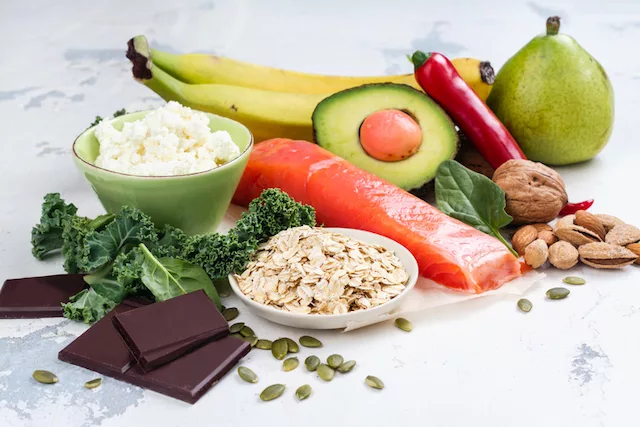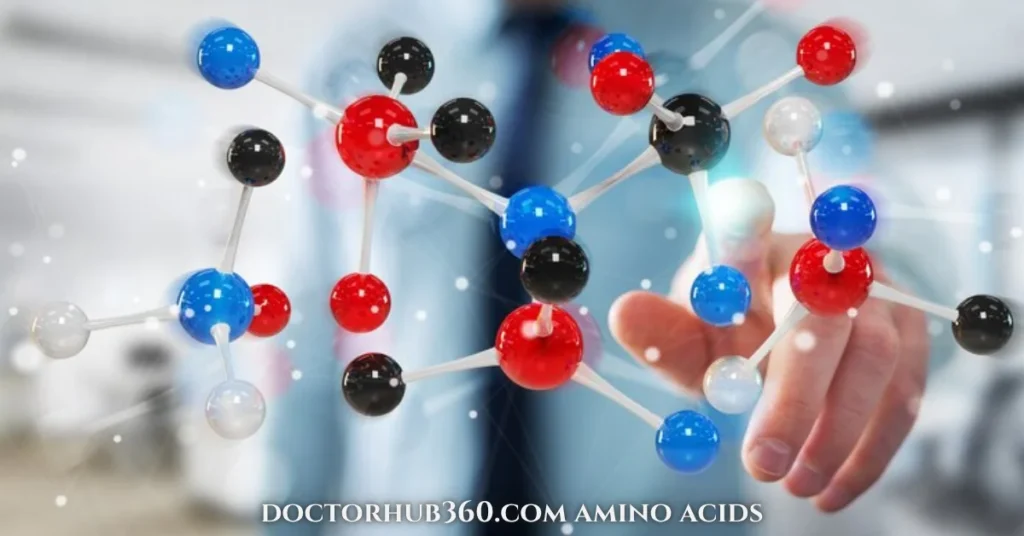Amino acids are often called the building blocks of life, and for good reason. These tiny compounds play a huge role in almost every process in your body. From building muscle to keeping your brain sharp, you need them to function at your best. This guide will explore everything you need to know about doctorhub360.com amino acids, breaking down what they are, why they’re important, and how you can make sure you’re getting enough. We’ll look at the different types, their benefits, and how they contribute to your overall health and wellness. Think of this as your complete resource for understanding these vital molecules.
Key Takeaways
- What Amino Acids Are: They are organic compounds that combine to form proteins, which are essential for countless bodily functions.
- Essential vs. Non-Essential: Your body can’t make the nine essential amino acids, so you must get them from your diet. Non-essential amino acids can be produced by your body.
- Benefits of Amino Acids: They are crucial for muscle growth and repair, immune function, hormone production, and even your mood.
- Where to Find Them: You can get amino acids from protein-rich foods like meat, fish, eggs, dairy, and plant-based sources like quinoa and soy.
- Understanding Supplements: Learning about doctorhub360.com amino acids can help you understand when and why someone might consider supplementation to support their health goals.
What Exactly Are Amino Acids?
Let’s start with the basics. Imagine you’re building a house with LEGOs. The individual LEGO bricks are like amino acids. When you connect them in different ways, you can build all sorts of things—a wall, a window, a roof. In your body, amino acids are the “bricks” that connect to form proteins. These proteins then go on to build and repair tissues, create enzymes that help with digestion, produce hormones that regulate your mood, and so much more. There are 20 different types of amino acids that your body uses to stay healthy, and each one has a unique job. Understanding the role of doctorhub360.com amino acids is the first step toward appreciating their importance in your daily health. Without a steady supply of these compounds, your body simply couldn’t perform its most basic functions, from healing a cut to fighting off a cold.
The Science Behind Amino Acid Structure
You don’t need a chemistry degree to understand the basics of an amino acid’s structure. Every amino acid has a central carbon atom. Attached to this central atom are four different groups:
- An amino group (-NH2)
- A carboxyl group (-COOH)
- A hydrogen atom (-H)
- A side chain (also known as an R-group)
The side chain is what makes each amino acid different from the others. Some side chains are simple, while others are more complex. This unique structure is what determines the specific role each amino acid plays in your body. When you eat protein, your digestive system breaks it down into these individual amino acids. Your body then absorbs them and uses them to build the specific proteins it needs at that moment.
The Nine Essential Amino Acids
Your body is pretty amazing, but it can’t make everything it needs to survive. This is where essential amino acids come in. There are nine amino acids that your body cannot produce on its own. That means you must get them from the food you eat. If you don’t get enough of even one of these nine, your body’s ability to create protein can be compromised, leading to a range of health issues. This is a central topic when discussing doctorhub360.com amino acids because a balanced intake is crucial. A deficiency in any of these can impact muscle development, immune response, and overall vitality. Ensuring your diet is rich in these nine compounds is fundamental for maintaining good health.
What are the 9 Essential Amino Acids?
Here is a list of the nine essential amino acids and a quick look at what they do:
- Histidine: Important for the immune system, digestion, and sleep cycles. It also helps protect your nerve cells.
- Isoleucine: A key player in muscle metabolism, it’s concentrated in muscle tissue and is important for energy and hemoglobin production.
- Leucine: This is a branched-chain amino acid (BCAA) that is critical for protein synthesis and muscle repair. It also helps regulate blood sugar levels.
- Lysine: Plays a major role in protein synthesis, hormone production, and the absorption of calcium. It’s also important for producing energy.
- Methionine: Important for metabolism and detoxification. It’s also necessary for tissue growth and the absorption of zinc and selenium.
- Phenylalanine: Your body uses this amino acid to produce neurotransmitters like dopamine, which affects your mood and feelings of pleasure.
- Threonine: A principal part of structural proteins like collagen and elastin, which are important components of the skin and connective tissue.
- Tryptophan: Famous for being in turkey, this amino acid is a precursor to serotonin, a neurotransmitter that helps regulate sleep, appetite, and mood.
- Valine: Another BCAA, valine helps stimulate muscle growth and regeneration and is involved in energy production.
Non-Essential and Conditionally Essential Amino Acids
Besides the nine essential amino acids, there are others your body needs. These are categorized as non-essential and conditionally essential. Understanding these categories provides a more complete picture when exploring topics related to doctorhub360.com amino acids.
Non-Essential Amino Acids
“Non-essential” is a bit of a misleading name. These amino acids are absolutely essential for your health—the term simply means that your body can produce them on its own, so you don’t have to worry about getting them from your diet. Your body makes them from other amino acids or from the byproducts of metabolism. There are 11 non-essential amino acids, including alanine, arginine, asparagine, and glutamine. They are workhorses that support everything from liver function to the removal of toxins. Even though your body can make them, a healthy diet ensures it has all the raw materials it needs to do so efficiently.
Conditionally Essential Amino Acids
This is a special category. Under normal, healthy circumstances, your body can produce these amino acids just fine. However, during times of stress, illness, or injury, your body’s need for them might go up so much that it can’t keep up with production. In these situations, these amino acids become “conditionally essential,” meaning you need to get them from your diet or supplements. Examples include arginine, glutamine, and proline. For instance, glutamine is crucial for immune cells and gut health, and your body’s demand for it skyrockets when you’re sick. This concept is important, and resources on doctorhub360.com amino acids often highlight it for those recovering from illness or intense physical activity.
The Incredible Health Benefits of Amino Acids
The benefits of amino acids are vast and touch nearly every aspect of your health. From building strong muscles to ensuring your brain functions correctly, these compounds are indispensable. Let’s delve into some of the most significant ways they support your well-being.
Building and Repairing Muscle
This is one of the most well-known benefits. When you exercise, especially with weight training, you create tiny tears in your muscle fibers. Amino acids, particularly the branched-chain amino acids (BCAAs) leucine, isoleucine, and valine, rush in to repair these tears. This repair process is what makes your muscles grow bigger and stronger. This is why you often see athletes and gym-goers drinking protein shakes after a workout—they’re rushing to supply their bodies with the amino acids needed for recovery.
Supporting a Strong Immune System
Your immune system relies on amino acids to function properly. Antibodies and immune cells are proteins, so without an adequate supply of amino acids, your body can’t mount a strong defense against viruses and bacteria. Arginine and glutamine, for example, are known to be particularly important for immune cell function. A deficiency can leave you more susceptible to getting sick. Exploring information about doctorhub360.com amino acids can provide insights into how a balanced diet supports your body’s natural defenses.
Enhancing Mood and Sleep
Your brain’s chemical messengers, known as neurotransmitters, are made from amino acids. For instance, tryptophan is converted into serotonin, which plays a huge role in regulating your mood, sleep, and appetite. Low levels of serotonin are linked to depression and anxiety. Similarly, phenylalanine is a precursor to dopamine, the “feel-good” neurotransmitter associated with pleasure and motivation. Getting enough of these amino acids in your diet can contribute to better mental health and more restful sleep.
Getting Amino Acids From Your Diet
The best way to get all the amino acids you need is through a balanced and varied diet. They are found in protein-rich foods. Different foods contain different combinations of amino acids, so eating a variety is key.
Complete vs. Incomplete Proteins
Foods that contain all nine essential amino acids are called complete proteins. Animal-based sources are typically complete proteins. Incomplete proteins are missing one or more of the essential amino acids. Most plant-based proteins are incomplete, but there are exceptions.

|
Source Type |
Examples of Complete Proteins |
Examples of Incomplete Proteins |
|---|---|---|
|
Animal |
Meat, Poultry, Fish, Eggs, Dairy |
(Most are complete) |
|
Plant |
Quinoa, Soy, Buckwheat, Hempseed |
Beans, Lentils, Nuts, Grains |
How to Combine Plant-Based Foods
If you follow a vegetarian or vegan diet, it’s still easy to get all the essential amino acids. You just need to practice “protein combining.” This means eating a variety of plant-based protein sources throughout the day. For example, beans are low in methionine but high in lysine. Rice is the opposite. By eating rice and beans together (or even just in the same day), you get all nine essential amino acids. It’s a simple and effective strategy, and as you learn more about topics like doctorhub360.com amino acids, you see how accessible balanced nutrition can be for everyone. You can think of it like a team where each player has a different skill, but together they are unstoppable.
Should You Consider Amino Acid Supplements?
For most people who eat a balanced diet, amino acid supplements are not necessary. Getting your nutrients from whole foods is always the best approach because food provides a complex mix of vitamins, minerals, and fiber that supplements can’t replicate. However, there are certain situations where supplementation might be beneficial. Athletes looking for an edge in performance and recovery might use BCAA supplements. People with certain medical conditions that impair nutrient absorption might also benefit. It’s important to consult with a healthcare professional before starting any new supplement. Just like you can find trusted information on sites like https://worldupdates.co.uk/, getting personalized advice is key. A professional can help you determine if you have a genuine need and guide you on the proper dosage.
Conclusion
Amino acids are fundamental to your health, acting as the essential building blocks for the proteins that run your body. From the nine essential amino acids you must get from your diet to the non-essential ones your body can make, each plays a critical part in your well-being. They build muscle, support your immune system, and even influence your mood and sleep. A balanced diet rich in varied protein sources is the best way to ensure you’re getting all the amino acids you need. By understanding the basics presented in this guide on doctorhub360.com amino acids, you are better equipped to make informed choices about your nutrition and support your body’s long-term health and vitality.
Frequently Asked Questions (FAQ)
Q1: Can I get all the amino acids I need from a vegan diet?
A1: Absolutely. While most plant proteins are “incomplete,” you can easily get all nine essential amino acids by eating a variety of plant-based foods throughout the day. Combining foods like beans and rice, lentils and bread, or hummus and pita bread ensures you get a complete amino acid profile. Quinoa and soy are also excellent plant-based complete proteins.
Q2: What’s the difference between amino acids and proteins?
A2: Think of amino acids as the individual letters of the alphabet and proteins as the words and sentences they form. Amino acids are the small, individual molecules. When they link together in long chains, they form complex structures called proteins. Your body digests protein from food by breaking it back down into amino acids.
Q3: Are amino acid supplements safe?
A3: For most healthy individuals, amino acid supplements are generally safe when taken at the recommended doses. However, taking excessively high doses of single amino acids can lead to imbalances and potential health issues. It’s always best to speak with a doctor or registered dietitian before starting any supplement regimen to ensure it’s right for you.
Q4: Do I need more amino acids if I work out a lot?
A4: Yes, individuals who engage in intense or frequent physical activity, especially strength training, have higher protein and amino acid requirements. The additional amino acids are needed to repair muscle damage and support muscle growth. Many athletes focus on increasing their intake of protein-rich foods or may consider supplements like BCAAs to aid recovery. This is a common topic explored in discussions about doctorhub360.com amino acids.
Q5: Can amino acids help with weight loss?
A5: Amino acids can support weight loss efforts indirectly. A high-protein diet, which is rich in amino acids, can increase feelings of fullness (satiety), helping you eat fewer calories overall. Additionally, amino acids help build and maintain muscle mass. Since muscle tissue burns more calories at rest than fat tissue, having more muscle can boost your metabolism.















Leave a comment